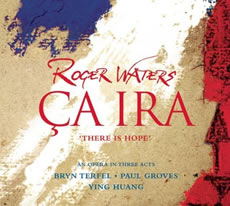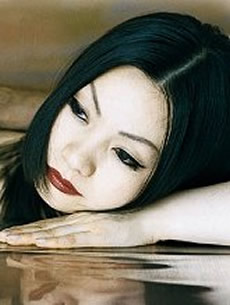
Image © Columbia Records 2005
 Ying Huang (soprano)
Ying Huang (soprano)
Image © Columbia Records 2005
|
|
(11 September 2005) Pink Floyd's Roger Waters has created Ça Ira, an opera in three acts for full orchestra, soloists and choir and is set during the French Revolution. The lyrics are based on Etienne Roda-Gil's original French libretto and the album is being released in the hybrid Super Audio CD format in Dolby Digital 5.1 SurroundSound (Columbia Records (USA) S2K 60867, 2005). Waters is no stranger to incorporating the elements of operatic form in his works. When he co-founded Pink Floyd in 1966, he began to bridge the worlds of rock and classical music in such pioneering major works as The Dark Side Of The Moon (1973) and The Wall (1979). He experimented and was successful in using theatricality, coherent narrative, dramatic arcs, thematic music and song cycles in a pop context in his creations. The work on Ça Ira began in 1989 during the Bicentennial of the French Revolution. The title roughly translates from French to English, as "life is going to be fine." Roger's use of the term Ça Ira is based on a French revolutionary song that became popular after the fall of the Bastille during the Revolution in 1789. The tune was taken from "Le carillon national". The opening words mean, "It will be alright." Roda-Gil's original libretto portrayed the events and the spirit of the French Revolution through a multitude of perspectives, ranging from Marie Antoinette to the eyes and ears of the period's revolutionaries and common people, to using a circus as a central theatrical framing device and metaphor. In 1997, Rogers began to write an English version of the work. He said, "I've stuck very much to the spirit of Etienne's original, adding to it somewhat. Although it's rooted in the history of the revolution, its philosophical slant is, I suppose, contemporary as well. It's more than just a history of the French Revolution, it's a piece about the human potential for change." The story of Ça Ira is based on the people of France who fought for a better world based on the ideals of liberty, equality and fraternity rather than one ruled by a callous and outmoded nobility. It occurred before the rise and fall of the guillotine and before the terror took hold. It is this story of hope and promise that inspired Ça Ira. Set during the optimistic early days of the French Revolution, Ça Ira is a work of stunning power and beauty, invoking the passion, madness, and triumph of faith in a time that forever changed the nature of the world. Orchestration and choral arrangements were created by Rick Wentworth and Roger Waters, who were also the album's producers. The music is exquisitely performed by the principal characters: Welsh bass-baritone Bryn Terfel (the Ringmaster, the Troublemaker, Louis Capet - the King of France); internationally acclaimed soprano Ying Huang (Marie Marianne - the Voice of Liberty, Reason and the Republic, Marie Antoinette - the Queen of France); American tenor Paul Groves (A Revolutionary Priest, A Military Officer); and Senegalese "one man orchestra" Ismael Lo (a Revolutionary Slave). Other parts are sung by Jamie Bower (Honest Bird - the young Revolutionary Priest) and Helen Russill (Madame Antoine - the young Marie Antoinette). The music and vocals are stunning, with lush, emotional melodies and orchestral dramatizations. This opera is an amazing creation which evokes a great sense of social awareness of the revolution which changed the course of history. The opera is also very theatrical, using sound effects and non-singing roles to enhance its impact. The performances of featured soprano Ying Huang are superb. Ça Ira has certainly been worth waiting for.  Waters' has certainly achieved success with his innovative and dynamic approach in this masterpiece. This opera is nothing short of breathtaking, and this awesome tour de force speaks for itself.--Audrey Elliot in New York Waters' has certainly achieved success with his innovative and dynamic approach in this masterpiece. This opera is nothing short of breathtaking, and this awesome tour de force speaks for itself.--Audrey Elliot in New York 
|







